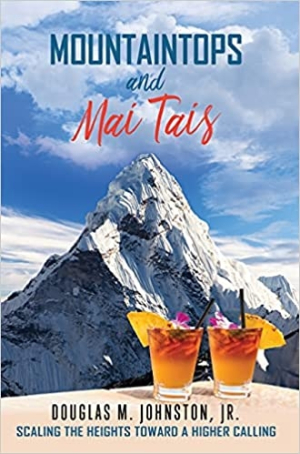Mountaintops and Mai Tais
Scaling the Heights Toward a Higher Calling
Mountaintops and Mai Tais is a spiritual memoir about decades’ worth of efforts to solve dangerous conflicts.
Douglas M. Johnston Jr.’s memoir Mountaintops and Mai Tais is about his career in public service and his work merging politics and faith.
Written as a family heirloom, Johnston’s book works to pass down information to future generations. Still, his story has broad appeal. It includes comedic turns, as well as inspirational moments, as with a story about how the National Prayer Breakfast changed Johnston’s life, setting him in a new direction. But all of this work begins in a different, exciting place: in the mountains of Afghanistan, with Johnston about to put his theories about religious dialogue to the test—and wondering whether the Muslim fundamentalists he was preparing to speak with would respond well to him, a man of another faith.
The book doubles back after its Afghanistan opening to chronicle Johnston’s story up to that point. Still, it often feels like two books flowed into one space. In part, it is the entertaining, amusing, and exciting account of Johnston’s early life, military service, struggles with faith, and involvement with political administrations. Here, the book includes candid assessments of political figures, as well as behind-the-scenes accounts of the intersections of government, military, and academic worlds. But the book shifts from this track in its coverage of the founding of the International Center for Religion and Diplomacy, an organization Johnston started to bring faith-based values into political discussions.
In covering the International Center for Religion and Diplomacy, the book dips into organizational history. The Center has done work in places including Kashmir, Pakistan, and Afghanistan. The lighthearted tone that wends into Johnston’s personal accounts is absent here; in its place are fascinating analyses of organizational developments and diplomatic efforts to ease conflicts. While still involving, the deviation toward this separate storytelling framework results in a jarring shift in the middle of the book.
Still, Johnston’s descriptions of global conflicts, and of the people involved in them, are effective. The chapter on Pakistan is of particular pertinence, covering the interweaving of politics, religion, and violence, which complicates diplomacy. Its treatment of Sami ul-Haq, the “Father of the Taliban,” depicts him as a complex man, despite outside stereotypes. And photographs are included as a complement to Johnston’s descriptions, while the book’s extensive appendices reproduce documents and letters of critical importance to his tale.
Mountaintops and Mai Tais is a spiritual memoir about decades’ worth of efforts to solve dangerous conflicts.
Reviewed by
Matt Benzing
Disclosure: This article is not an endorsement, but a review. The publisher of this book provided free copies of the book and paid a small fee to have their book reviewed by a professional reviewer. Foreword Reviews and Clarion Reviews make no guarantee that the publisher will receive a positive review. Foreword Magazine, Inc. is disclosing this in accordance with the Federal Trade Commission’s 16 CFR, Part 255.

